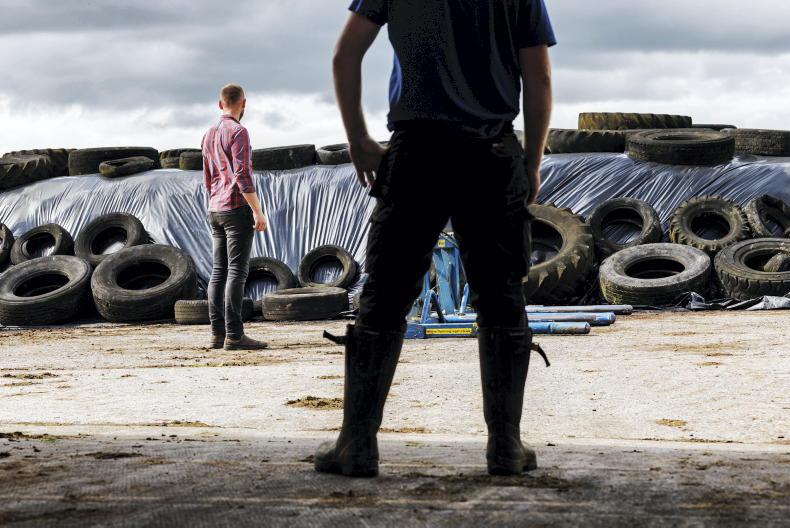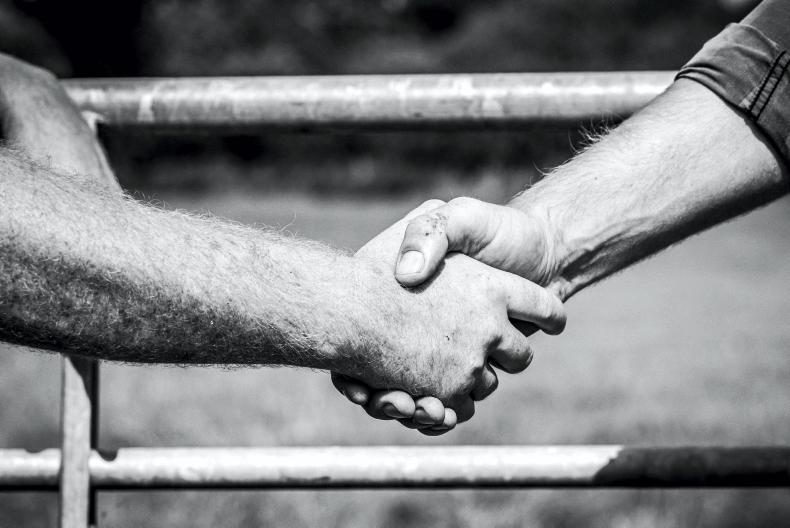Four in 10 farmers would advise a fellow farmer getting married to consider having a prenuptial agreement, an Irish Farmers Journal survey has found.
Some 41% of 1,982 farmers said they would advise farmers getting married to consider signing a prenuptial agreement, although they are not currently a legally-binding document in the Irish legal system.
A prenuptial agreement is an agreement made between two people before marriage in relation to property, maintenance and custody arrangements if their marriage should break down.
Some 17% of those surveyed said they wouldn’t advise a colleague to consider drawing up a prenup, while a further 42% said they were not sure.
Interestingly, some 30 married farmers (2%) in the survey said they had signed a prenup, while a further 30 farmers (2%) had considered the idea but ultimately did not have one drawn up.
The legal standing of prenups is something that IFA farm family chair Alice Doyle is pursuing following a series of well-attended succession meetings earlier this year where the potential impact of marriage breakdown was repeatedly highlighted.
“In some cases, it was raised by people who had been stung by separation or divorce themselves, and who felt that if they had a prenup, things might have worked out differently,” she told the Irish Farmers Journal.
Doyle pointed out that often the chief concern is about protecting the farm, as both a financial and an inter-generational asset.
“You can never ignore John B Keane’s The Field,” she warns. “Irish people have an unusually strong affiliation to land.”
The complexity of land as a working asset is also a major factor in the interest in prenups, Doyle points out.
“If that asset is divided, it can be left unviable for both sides, unable to generate enough income,” she says.
“It gets even more complex when you bring in a second (older) generation into it, as well as farms with debt attached and sometimes complications over ownership.”
However, changing times are also a major factor in the demand for prenups to have legal standing.
“Years ago, it might have been a woman marrying into a farm but these days there are a lot of women farming in their own right, particularly in the dairy sector, and it could be a male marrying into the farm,” she explained.
“And these days whoever is marrying in, male or female, they might have substantial assets, income or pension rights of their own.
“Either partner could have property of their own.
“If you had an apartment in Dublin you could be talking about as asset worth €800,000 with a rental income of €2,000 per month – that would be more than the farm is worth!”
Bizarrely, while prenups signed by married people do not have legal standing, unmarried couples have the option of a very similar agreement which is recognised by the Irish courts.

'Either partner could have property of their own.'
The Civil Partnership and Certain Rights and Obligations of Cohabitants Act 2010 allows for a “cohabitants’ agreement” to provide for financial matters during the relationship or when the relationship ends.
Doyle’s IFA farm family committee has made initial contact with the powers that be in the Irish legal system, with the aim of having the same option made available to married couples as unmarried couples.
“It’s crazy that just because you put a ring on someone’s finger, you can’t have the same agreement,” she says.
The IFA wants the issue to be assessed when family law reform is being debated.
“Our position is that prenups should be available as an option to every couple. Everyone’s circumstances are different but it’s only fair that the option should be there.”
Legal view:
open and honest
conversations needed
Agri solicitor Aisling Meehan said there is an appetite among farmers for legislation to be brought in “to at least give farmers a choice as to whether to have a prenuptial agreement or not”.
“Many couples have chosen to enter into a prenuptial agreement to at least record their intent and respective financial positions at the time of the marriage,” she told the Irish Farmers Journal.
Benefits
She cited a number of benefits to drawing up a prenup agreement, including:
Control over the course and conduct of the relationship.Choice as to the nature of the relationship.Conflict in the future can be reduced.Cost of any future dissolution of the marriage can be reduced.Attitudes
“Giving prenuptial agreements legal standing would open up a forum to have open and honest conversations about the future of the family farm and to establish people’s attitudes to succession and inheritance,” she said.
“This is often not discussed on family farms.”
Four in 10 farmers would advise a fellow farmer getting married to consider having a prenuptial agreement, an Irish Farmers Journal survey has found.
Some 41% of 1,982 farmers said they would advise farmers getting married to consider signing a prenuptial agreement, although they are not currently a legally-binding document in the Irish legal system.
A prenuptial agreement is an agreement made between two people before marriage in relation to property, maintenance and custody arrangements if their marriage should break down.
Some 17% of those surveyed said they wouldn’t advise a colleague to consider drawing up a prenup, while a further 42% said they were not sure.
Interestingly, some 30 married farmers (2%) in the survey said they had signed a prenup, while a further 30 farmers (2%) had considered the idea but ultimately did not have one drawn up.
The legal standing of prenups is something that IFA farm family chair Alice Doyle is pursuing following a series of well-attended succession meetings earlier this year where the potential impact of marriage breakdown was repeatedly highlighted.
“In some cases, it was raised by people who had been stung by separation or divorce themselves, and who felt that if they had a prenup, things might have worked out differently,” she told the Irish Farmers Journal.
Doyle pointed out that often the chief concern is about protecting the farm, as both a financial and an inter-generational asset.
“You can never ignore John B Keane’s The Field,” she warns. “Irish people have an unusually strong affiliation to land.”
The complexity of land as a working asset is also a major factor in the interest in prenups, Doyle points out.
“If that asset is divided, it can be left unviable for both sides, unable to generate enough income,” she says.
“It gets even more complex when you bring in a second (older) generation into it, as well as farms with debt attached and sometimes complications over ownership.”
However, changing times are also a major factor in the demand for prenups to have legal standing.
“Years ago, it might have been a woman marrying into a farm but these days there are a lot of women farming in their own right, particularly in the dairy sector, and it could be a male marrying into the farm,” she explained.
“And these days whoever is marrying in, male or female, they might have substantial assets, income or pension rights of their own.
“Either partner could have property of their own.
“If you had an apartment in Dublin you could be talking about as asset worth €800,000 with a rental income of €2,000 per month – that would be more than the farm is worth!”
Bizarrely, while prenups signed by married people do not have legal standing, unmarried couples have the option of a very similar agreement which is recognised by the Irish courts.

'Either partner could have property of their own.'
The Civil Partnership and Certain Rights and Obligations of Cohabitants Act 2010 allows for a “cohabitants’ agreement” to provide for financial matters during the relationship or when the relationship ends.
Doyle’s IFA farm family committee has made initial contact with the powers that be in the Irish legal system, with the aim of having the same option made available to married couples as unmarried couples.
“It’s crazy that just because you put a ring on someone’s finger, you can’t have the same agreement,” she says.
The IFA wants the issue to be assessed when family law reform is being debated.
“Our position is that prenups should be available as an option to every couple. Everyone’s circumstances are different but it’s only fair that the option should be there.”
Legal view:
open and honest
conversations needed
Agri solicitor Aisling Meehan said there is an appetite among farmers for legislation to be brought in “to at least give farmers a choice as to whether to have a prenuptial agreement or not”.
“Many couples have chosen to enter into a prenuptial agreement to at least record their intent and respective financial positions at the time of the marriage,” she told the Irish Farmers Journal.
Benefits
She cited a number of benefits to drawing up a prenup agreement, including:
Control over the course and conduct of the relationship.Choice as to the nature of the relationship.Conflict in the future can be reduced.Cost of any future dissolution of the marriage can be reduced.Attitudes
“Giving prenuptial agreements legal standing would open up a forum to have open and honest conversations about the future of the family farm and to establish people’s attitudes to succession and inheritance,” she said.
“This is often not discussed on family farms.”











SHARING OPTIONS